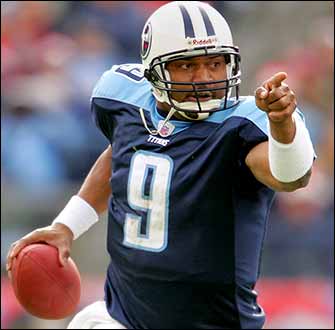McNair Murder's Mystery
 The outpouring of emotion this week in the wake of Steve McNair's death has left Homerism ruminating on the nature of how we view our sports heroes.
The outpouring of emotion this week in the wake of Steve McNair's death has left Homerism ruminating on the nature of how we view our sports heroes.
It's a topic that has been beaten to death by sports pundits and social commentators ever since Chuck Barkley declared he's not a role model. Yet, the circumstances surrounding Air McNair's untimely death puts the dichotomy between legends on the field and mortals off of it in such stark relief.
Elizabeth Merrill of ESPN.com wrote an interesting piece earlier this week about how Nashville is coping with the loss of the man who put the Titans on the map. As a Baltimore Ravens fan, I had a chance to watch McNair in the twilight of his career, but my impression of him seems to jive with his reputation in Tennessee and his home state of Mississippi: excellent leader in the huddle, equally good community leader.
Now, the fact that he was killed by his young mistress raises the issue of who McNair really was. The easy answer would be that McNair--and others like him who have been caught in compromising situations recently--was nothing more than a mirage. He was just a celebrity who built up his public image through good works to create a smokescreen that would give him cover for what was going on behind the scenes. Or, perhaps in his own mind McNair justified his personal indiscretions by drawing on a stock of accumulating credits for his community involvement, like a bookkeeper adjusting the ledger.
Here's an even scarier conclusion, and one that is much tougher to wrap your arms around: McNair really was a great person; he made mistakes and paid dearly for them. His death is a reminder of how easy it is for even the best people to stay above board all the time.
Equally important in all of this, though, is the question of why we even need to create an overarching theme to explain McNair's life. The psychology of sports fandom really is perplexing. What brings us to cheer for athletes, let alone idolize them?
There are plenty of reasons to pick favorite teams and players. At some level, though, we think these choices reflect something about our own personal identities. We follow local teams because they supposedly represent the places where we've planted our flags. We hate our rivals because somehow losing to them means something about us just isn't good enough. (And you can't trade out, because front-running signifies lack of conviction and taking the easy way out.)
It's part of what makes sports fun. But, damn, it's awfully unforgiving.
We readily assume we should be ashamed when we learn more about our personal sports icons than we want to, because rooting for them as athletes means that somehow our very essences are intertwined. Likewise, we rationalize away their failings as we would our own.
Nevermind that a superstar recruit may have committed to your school because it's where his girlfriend wanted to go. Nevermind that a slugger may have signed with your team because it's where he got the most money. Nevermind that you as a fan have about as much control over who athletes have sex with as you do over whether they actually catch the game-winning touchdown.
Truth is, we'd all probably be a lot better off if we came to grips with the fact that we're merely spectators. Love guys like McNair for the ways he thrilled you while performing. Don't mistake his shortcomings--and his accomplishments--for your own.
